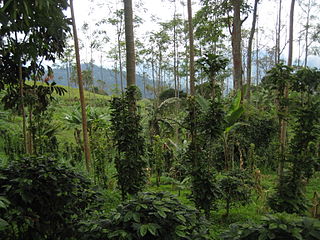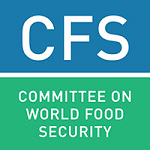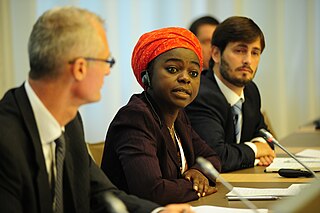
The World Farmers' Organization (WFO) is an international organisation of farmers with a focus on agroecology, farming typologies, food chains, indigenous peoples, and mountain farming.

The World Farmers' Organization (WFO) is an international organisation of farmers with a focus on agroecology, farming typologies, food chains, indigenous peoples, and mountain farming.
A former organisation, the International Federation of Agricultural Producers, was dissolved in 2010. It had been the subject of criticism for mostly middle-class to rich farmers from the Global North. [1]
The World Farmers Organisation (WFO) was established in Rome, Italy, on 12 July 2011, with the aim of representing and advocating for farmers around the world, and bringing farmers and cooperatives together to develop policies and programs to provide solutions to global food security issues. [2] [3]
The WFO has its headquarters in Rome. [2] [3] It is an international organisation of farmers with a focus on agroecology, farming typologies, food chains, indigenous peoples, and mountain farming. It aims to strengthen agricultural producers and farmers' positions within value chains, with a particular focus on smallholder farmers. It closely cooperates with the Food and Agriculture Organization, which is also headquartered in Rome. [2] [4] [5] It also aims to improve the livelihood of producers and rural communities in general.
Researcher Annette Schramm of the University of Tübingen in Germany in 2017 voiced criticism of the WFO for acting as a successor to the now-defunct IFAP, with its focus on representing middle-class to rich farmers from the Global North, and a threat to the Civil Society Mechanism, [1] (now Civil Society and Indigenous Peoples' Mechanism (CSIPM)), an autonomous part of the United Nations Committee on World Food Security. [6]
WFO cooperates with Bayer in several projects (WFO Gymnasium, "Cattle4Care"). [3] [7] [8]
Robert Carlson of the United States was president of the WFO before the election of Peter Kendall of the United Kingdom in March 2014, [9] but resigned in October 2014 owing to being appointed to a UK government post. [10]
Evelyn Nguleka, who was the first woman president of Zambia Agricultural Organization and the Zambia National Farmers Union, [11] was appointed as acting president in October 2014, [10] [12] and president in 2015. [13] After her resignation on 22 September 2016, WFO vice-president William Rolleston, president of the Federated Farmers of New Zealand, stepped into the acting role. [12]
On 13 June 2017, South African farmer Theo de Jager was elected president. He was the first South African to assume the role. He had led the Southern African Confederation of Agricultural Unions since 2013, and had also had a stint as president of the Pan-African Farmers' Organisation. [14]
In June 2022 Arnold Puech d'Alissac, a family farmer from the Normandy region in northern France, was elected president, and remains in the position as of June 2024 [update] . From 2017 until 2022 he had represented the European constituency on the WFO board. [15] His term ends in 2026. [16]
In June 2024, Fiona Simson, who had been first female president of the National Farmers' Federation in Australia from 2016 until 2023 and was elected to the WFO board in 2023, was elected vice-president of the WFO. She is the first Australian vice-president. [17]

A farmer is a person engaged in agriculture, raising living organisms for food or raw materials. The term usually applies to people who do some combination of raising field crops, orchards, vineyards, poultry, or other livestock. A farmer might own the farmland or might work as a laborer on land owned by others. In most developed economies, a "farmer" is usually a farm owner (landowner), while employees of the farm are known as farm workers. However, in other older definitions a farmer was a person who promotes or improves the growth of plants, land, or crops or raises animals by labor and attention.

Organic farming, also known as ecological farming or biological farming, is an agricultural system that uses fertilizers of organic origin such as compost manure, green manure, and bone meal and places emphasis on techniques such as crop rotation and companion planting. It originated early in the 20th century in reaction to rapidly changing farming practices. Certified organic agriculture accounts for 70 million hectares globally, with over half of that total in Australia. Biological pest control, mixed cropping, and the fostering of insect predators are encouraged. Organic standards are designed to allow the use of naturally-occurring substances while prohibiting or strictly limiting synthetic substances. For instance, naturally-occurring pesticides such as pyrethrin are permitted, while synthetic fertilizers and pesticides are generally prohibited. Synthetic substances that are allowed include, for example, copper sulfate, elemental sulfur, and veterinary drugs. Genetically modified organisms, nanomaterials, human sewage sludge, plant growth regulators, hormones, and antibiotic use in livestock husbandry are prohibited. Organic farming advocates claim advantages in sustainability, openness, self-sufficiency, autonomy and independence, health, food security, and food safety.
The International Treaty on Plant Genetic Resources for Food and Agriculture, is a comprehensive international agreement in harmony with the Convention on Biological Diversity, which aims at guaranteeing food security through the conservation, exchange and sustainable use of the world's plant genetic resources for food and agriculture (PGRFA), the fair and equitable benefit sharing arising from its use, as well as the recognition of farmers' rights. It was signed in 2001 in Madrid, and entered into force on 29 June 2004.

Sustainable agriculture is farming in sustainable ways meeting society's present food and textile needs, without compromising the ability for current or future generations to meet their needs. It can be based on an understanding of ecosystem services. There are many methods to increase the sustainability of agriculture. When developing agriculture within sustainable food systems, it is important to develop flexible business processes and farming practices. Agriculture has an enormous environmental footprint, playing a significant role in causing climate change, water scarcity, water pollution, land degradation, deforestation and other processes; it is simultaneously causing environmental changes and being impacted by these changes. Sustainable agriculture consists of environment friendly methods of farming that allow the production of crops or livestock without causing damage to human or natural systems. It involves preventing adverse effects on soil, water, biodiversity, and surrounding or downstream resources, as well as to those working or living on the farm or in neighboring areas. Elements of sustainable agriculture can include permaculture, agroforestry, mixed farming, multiple cropping, and crop rotation.
Agroecology is an academic discipline that studies ecological processes applied to agricultural production systems. Bringing ecological principles to bear can suggest new management approaches in agroecosystems. The term can refer to a science, a movement, or an agricultural practice. Agroecologists study a variety of agroecosystems. The field of agroecology is not associated with any one particular method of farming, whether it be organic, regenerative, integrated, or industrial, intensive or extensive, although some use the name specifically for alternative agriculture.
IFOAM – Organics International is a worldwide organization advocating for organics, with over 700 affiliates in more than 100 countries and territories.

Food sovereignty is a food system in which the people who produce, distribute, and consume food also control the mechanisms and policies of food production and distribution. This stands in contrast to the present corporate food regime, in which corporations and market institutions control the global food system. Food sovereignty emphasizes local food economies, sustainable food availability, and centers culturally appropriate foods and practices. Changing climates and disrupted foodways disproportionately impact indigenous populations and their access to traditional food sources while contributing to higher rates of certain diseases; for this reason, food sovereignty centers indigenous peoples. These needs have been addressed in recent years by several international organizations, including the United Nations, with several countries adopting food sovereignty policies into law. Critics of food sovereignty activism believe that the system is founded on inaccurate baseline assumptions; disregards the origins of the targeted problems; and is plagued by a lack of consensus for proposed solutions.

La Vía Campesina is an international farmers organization founded in 1993 in Mons, Belgium, formed by 182 organisations in 81 countries, and describing itself as "an international movement which coordinates peasant organizations of small and middle-scale producers, agricultural workers, rural women, and indigenous communities from Asia, Africa, America, and Europe".

World Food Day is an international day celebrated every year worldwide on October 16 to commemorate the date of the founding of the United Nations Food and Agriculture Organization in 1945. The day is celebrated widely by many other organizations concerned with hunger and food security, including the World Food Programme, the World Health Organization and the International Fund for Agricultural Development. WFP received the Nobel Prize in Peace for 2020 for their efforts to combat hunger, contribute to peace in conflict areas, and for playing a leading role in stopping the use of hunger in the form of a weapon for war and conflict.

The National Farmers' Federation (NFF) is an Australian non-profit membership–based organisation that represents farmers and the agricultural sector in Australia. The NFF has been a key player in a number of industrial relations disputes, including the 1998 waterfront dispute.
The Global Forum on Agricultural Research and Innovation (GFAR) is an inclusive global forum, enabling all those concerned with the future of agriculture and its role in development around the world, to address key global needs. GFAR provides an open forum for stakeholders across the agricultural spectrum—ranging from researchers, organizations, and farmers—to participate in collaborative discussion and action around the current and future state of agriculture.
The term food system describes the interconnected systems and processes that influence nutrition, food, health, community development, and agriculture. A food system includes all processes and infrastructure involved in feeding a population: growing, harvesting, processing, packaging, transporting, marketing, consumption, distribution, and disposal of food and food-related items. It also includes the inputs needed and outputs generated at each of these steps. Food systems fall within agri-food systems, which encompass the entire range of actors and their interlinked value-adding activities in the primary production of food and non-food agricultural products, as well as in food storage, aggregation, post-harvest handling, transportation, processing, distribution, marketing, disposal, and consumption. A food system operates within and is influenced by social, political, economic, technological and environmental contexts. It also requires human resources that provide labor, research and education. Food systems are either conventional or alternative according to their model of food lifespan from origin to plate. Food systems are dependent on a multitude of ecosystem services. For example, natural pest regulations, microorganisms providing nitrogen-fixation, and pollinators.

Agroecology is an applied science that involves the adaptation of ecological concepts to the structure, performance, and management of sustainable agroecosystems. In Latin America, agroecological practices have a long history and vary between regions but share three main approaches or levels: plot scale, farm scale, and food system scale. Agroecology in Latin American countries can be used as a tool for providing both ecological, economic, and social benefits to the communities that practice it, as well as maintaining high biodiversity and providing refuges for flora and fauna in these countries. Due to its broad scope and versatility, it is often referred to as "a science, a movement, a practice."
Miguel Altieri is a Chilean born agronomist and entomologist. He is a Professor of Agroecology at the University of California, Berkeley in the Department of Environmental Science, Policy and Management.

The Committee on World Food Security (CFS) was is an intergovernmental body within the United Nations System.
Costa Rican agriculture plays a profound part in the country's gross domestic product (GDP). It makes up about 6.5% of Costa Rica's GDP, and 14% of the labor force. Depending upon location and altitude, many regions differ in agricultural crops and techniques. The main exports include: bananas, pineapples, coffee, sugar, rice, vegetables, tropical fruits, ornamental plants, corn, potatoes and palm oil.

Regenerative agriculture is a conservation and rehabilitation approach to food and farming systems. It focuses on topsoil regeneration, increasing biodiversity, improving the water cycle, enhancing ecosystem services, supporting biosequestration, increasing resilience to climate change, and strengthening the health and vitality of farm soil.
ECHO, Inc is a non-profit agro-ecological organization whose mission is to support small-scale farmers through the dissemination of information and seeds. The group operate a bank which preserves and distributes. ECHO also offers training courses and workshops on many topics, including tropical agriculture.
A number of movements seek to expand the practice of agroecology in West Africa. Agroecology is a scientific discipline, movement and practice that integrates ecology in agriculture with strong emphasis on diversification, food sovereignty, energy efficiency and sustainability. Agroecological practices apply the systems and knowledge that traditional farmers in the region have developed and inherited. The agroecological social movement empowers smallholder farmers that hold the knowledge of indigenous farming systems, however are recently engulfed by larger farms or are migrating to urban areas, looking for better paying jobs.

Evelyn Nguleka was a veterinarian, farmer, and president of the World Farmers' Organisation from mid-2015 to mid-2016.